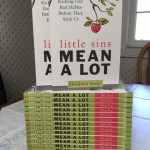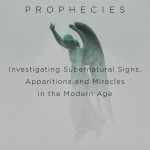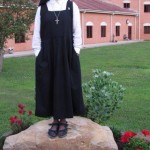Gerald at Closed Cafeteria links to a fascinating read in America Magazine, as a priest, Fr. Michael Kerper, relates his insights and feelings upon performing his first Traditional Latin Mass. Enormously interesting, and humbling stuff:
…As I studied the Latin texts and intricate rituals I had never noticed as a boy, I discovered that the old rite’s priestly spirituality and theology were exactly the opposite of what I had expected. Whereas I had looked for the “high priest/king of the parish” spirituality, I found instead a spirituality of “unworthy instrument for the sake of the people.”
…I actually felt liberated from a persistent need to perform, to engage, to be forever a friendly celebrant…
The act of praying the Roman Canon slowly and in low voice accented my own smallness and mere instrumentality more than anything else. Plodding through the first 50 or so words of the Canon, I felt intense loneliness. As I moved along, however, I also heard the absolute silence behind me, 450 people of all ages praying, all bound mysteriously to the words I uttered and to the ritual actions I haltingly and clumsily performed. Following the consecration, I fell into a paradoxical experience of intense solitude as I gazed at the Sacrament and an inexplicable feeling of solidarity with the multitude behind me.
Interestingly, he is not the first priest I have heard describe the act of praying the Latin Mass as “liberating.” I believe it, too, because the liturgy takes the focus off the priest, and puts it where it belongs – on the Holy Eucharist. This goes hand-in-hand with this very interesting post by Deacon Greg, who explains why it is that a priest holding aloft a Monstrance uses a Humeral Veil to cover his hands:
Most lay people, and even most priests, believe the minister uses it because he is unworthy to touch the monstrance or get that close to the Blessed Sacrament. Considering that the priest or deacon places the host in the monstrance, and later reposes it in the tabernacle, that’s not quite accurate. And neither is the notion that it’s just an additional sign of reverence.
So why does he use it?
It is to separate himself from the act of blessing.
The priest or deacon blesses the faithful with the Blessed Sacrament — but by wrapping his hands in the humeral veil, he signifies his own removal from the action.
He doesn’t bless the people. Christ does.
Catholic worship over the past 30-or-so years has been (in my humble opinion) a little too horizontal – a little too much about “the people” and not enough about the Almighty. Our modern hymnals reek of our self-obsession, with one “praise song” after another being all about “us, us, us,” and “we, we, we” with some vague reference to “You,” now and then…and heaven help us if a male pronoun is uttered.
We don’t have to get into heavy duty chant mode, but the pope wants to move us away from modern mediocrity and me-ism and that’s not a bad plan. Me-ism really has no place in worship.
There is a great bit in Rumer Godden’s In This House of Brede, where the newly elected Abbess, Catherine, by tradition of the house, sings to her community the Christmas Martyrology:
Standing under an arch of holly, evergreens and mistletoe lit by scores of candles, Abbess Catherine began the long chant; not long in words but in its intricacies of melody; it was the chant of Christmas, it’s mystery and history, from the creation and beginnings of the world, through the Old testament, the patriarchs, the foundations of Rome, to the opening of the New Testament, “all woven together into a marvelous whole,” said Cecily. Though out of respect for Abbess Hester, not one of the community would have uttered it aloud, there was a tonic effect for them all in Abbess Catherine’s strong, well-rounded voice, her clear enunciation…The Christmas martyrology, thought the nuns, hasn’t come through to us like this for years. “It was splendid,” said Dame Perpetua in the abbess’s room. “You made it splendid.”
“It wasn’t I,” said Abbess Catherine. “It is splendid. That is the blessing of the liturgy, it wipes out self.”
Amen. I’ve been a Catholic all my life and have never heard the Christmas Martyrology chanted. I would love to. If it is anything like the exceptionally gorgeous Easter Proclamation, then I have clearly missed something transcendent, instructive and wonderful. We need more of that…less of our puny selves, in our worship. Balance. It’s all about balance. Too much of anything, one way or the other, is what trips us up. Perhaps after swinging too far, the pendulum of deconstructionism is finally heading back a bit.
An interesting essay on music and worship here, thanks to reader Dick.











